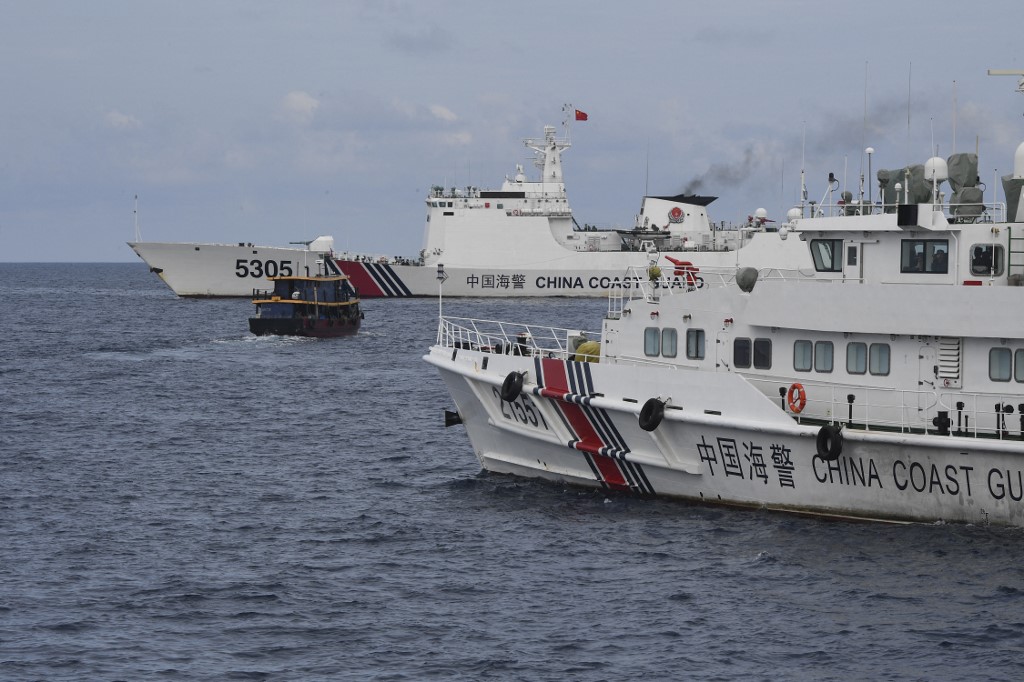
This photo taken on August 22, 2023 shows Chinese coast guard ships (L and R) corralling a Philippine civilian boat chartered by the Philippine navy to deliver supplies to Philippine navy ship BRP Sierra Madre in the disputed South China Sea. —photo by Ted Aljibe/Agence France-Presse
MANILA, Philippines — The Department of Foreign Affairs (DFA) disputed on Monday a statement from its Chinese counterpart about the need for prior notification and on-site confirmation before conducting resupply missions in Ayungin (Second Thomas) Shoal.
“The spokesperson’s statement … regarding prior notification and on-site confirmation is inaccurate,” the DFA said in a statement on Monday, a day after it announced that both sides had reached an “understanding” on a “temporary arrangement” for rotation and resupply missions (Rore) to the BRP Sierra Madre.
It was not clear, however if the provisions stated by the Chinese Ministry of Foreign Affairs (MFA) were part of the conditions under the agreement as both parties have yet to release specifics of the deal.
READ: West PH Sea: No Ayungin resupply since violent June 17 encounter
Responding to inquiries about the agreement, the Chinese MFA, in a statement sent by the Chinese Embassy in Manila around 12:42 a.m. on Monday, reiterated its “principled” position with three main points, primarily its demand for the Philippines to tow away the rusting warship, which serves as a military outpost in the West Philippine Sea.
“Between now and when the warship is towed away, should the Philippines need to send living necessities to the personnel living on the warship, China is willing to allow it in a humanitarian spirit if the Philippines informs China in advance and after on-site verification is conducted. China will monitor the entire resupply process,” it said.
The Chinese MFA added that Beijing would “absolutely” reject and “resolutely stop” any attempt by Manila to send large amounts of construction materials to the warship and build fixed facilities or permanent outposts.
Principled position
“On the basis of the above principled position, China recently had a series of consultation with the Philippines on managing the situation at Ren’ai Jiao (Beijing’s name for Ayungin Shoal) and reached provisional arrangement with the Philippines on humanitarian resupply of living necessities. The two sides agreed to jointly manage maritime differences and work for de-escalation in the South China Sea,” it said.
But in a statement released afterward, the DFA called out the “inaccuracy” of the prior notification and on-site confirmation conditions.
“The principles and approaches laid out in the agreement were reached through a series of careful and meticulous consultations between both sides that paved the way for a convergence of ideas without compromising national positions,” it said.
It also stressed that the agreement was concluded with the clear understanding on both sides that it would not prejudice both countries’ respective national positions.
According to the DFA, the Philippines will continue asserting its rights and jurisdiction in its maritime zone, including in Ayungin Shoal, which is within its exclusive economic zone and continental shelf.
“Nonetheless, in our desire to de-escalate the situation in the South China Sea and to manage differences in a peaceful manner, we emphasize that the agreement was done in good faith and the Philippines remains ready to implement it. We urge China to do the same,” it said.
Exchange of notes
When asked if the arrangement was documented, DFA spokesperson Teresita Daza told reporters that the deal was made through an “exchange of notes.”
The agreement was reached after a series of consultations following “frank and constructive discussions” between officials during the 9th Bilateral Consultation Mechanism on the South China Sea in Manila on July 2.
Meanwhile, Armed Forces of the Philippines spokesperson Col. Francel Margareth Padilla; Rear Adm. Roy Vincent Trinidad, Philippine Navy spokesperson for the West Philippine Sea; and Commodore Jay Tarriela, Philippine Coast Guard spokesperson for the West Philippine Sea, said they would defer comment on the issue to the DFA.
Defense Secretary Gilberto Teodoro Jr. also declined to comment, saying he would wait for the National Maritime Council to convene and for the DFA to relay the details of the agreement. —with a report from Nestor Corrales
For comprehensive coverage, in-depth analysis, and the latest updates on the West Philippine Sea issue, visit our special site here. Stay informed with articles, videos, and expert opinions.
